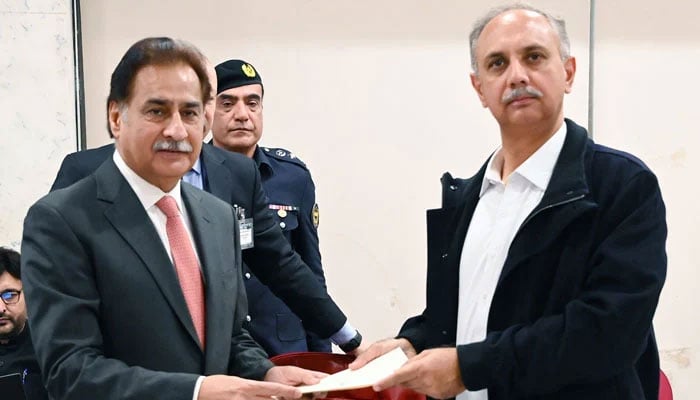NA speaker turns down Omar Ayub's demand to form committee on ECP appointments
Formation of parliamentary committee cannot take place before PM-opposition leader's consultation, NA speaker tells Ayub
June 15, 2025

- NA speaker writes letter to opposition leader.
- Outlines constitutional process for committee formation.
- Says consultations between PM-opposition leader ongoing.
ISLAMABAD: National Assembly Speaker Ayaz Sadiq has rejected Opposition Leader Omar Ayub’s demand to form a parliamentary committee for appointing a new chief election commissioner (CEC) and two members of the Election Commission of Pakistan (ECP), saying that the process cannot proceed without prior consultation between the prime minister and the opposition leader.
“Formation of the parliamentary committee cannot take place before the consultation process between the prime minister and the opposition leader is complete,” speaker Ayaz Sadiq wrote in a letter while responding to Ayub’s request.
Earlier on Thursday, Omar Ayub formally requested the lower house speaker to constitute the committee to initiate the appointment process.
He nominated six opposition members — four from the National Assembly and two from the Senate. The nominees from the lower house include MNA Barrister Gohar Ali Khan, MNA Asad Qaiser, MNA Hamid Raza, and MNA Latif Khosa.
The Senate nominees include Senator Shibli Faraz and Allama Raja Nasir Abbas.
Prime Minister Shehbaz Sharif had earlier initiated the consultation process by writing a letter to Omar Ayub on May 16, inviting him to participate in discussions regarding the appointments.
Responding to Omar Ayub's letter, Sadiq outlined the constitutional process for committee formation. He confirmed that consultations between the PM Shehbaz and the opposition leader are ongoing and underscored that the committee can only be formed after both parties submit their proposed names.
"If the prime minister and the opposition leader fail to reach a consensus, the matter will be referred to the NA speaker, who will then proceed with forming a parliamentary committee,” the letter states.
Following a formal request from the premier, the speaker will then ask parliamentary leaders to submit names for the committee. “The committee will be formed based on party representation in the National Assembly, and names will be included proportionally,” he clarified.
It is pertinent to know that the five-year term of CEC Sikandar Sultan Raja ended on January 26, along with two other members of the Election Commission i.e., Nisar Ahmad Durrani (Sindh) and Shah Muhammad Jatoi (Balochistan).
The procedure for appointing the CEC and members of the Election Commission is explained in Article 213 of the Constitution, wherein the PM and the leader of the opposition send three names to the president by consensus.
If there is no agreement on the names, the prime minister and the leader of the opposition will send their respective names to the parliamentary committee after which the National Assembly speaker will form a 12-member parliamentary committee, having equal representation from the treasury and opposition benches.
The committee will send one name from these names to the president for approval after a consensus.
As per Article 217, upon the expiry of the CEC’s term, the senior member will assume the responsibilities of the chief election commissioner and in the event of his absence or vacancy, the senior member will assume these responsibilities.
The two other members of the electoral body have over two years to continue, as the term of the Election Commission Member (ECM) from Punjab Babar Hassan Bharwana will end on May 29, 2027, whereas the term of the Khyber Pakhtunkhwa member Justice (retd) Ikramullah Khan will expire on May 31, 2027.
However, due to the deep political polarisation, there had been no previous hint of contact between the prime minister and the leader of the opposition in the National Assembly to deliberate on new names.
The PTI has already moved the Islamabad High Court over the matter with Ayub and Senate Opposition Leader Shibli Faraz challenging the delay in appointing a new CEC in March earlier this year.
The petition names the federal government, the Senate chairman, the National Assembly speaker, and the ECP as respondents.











